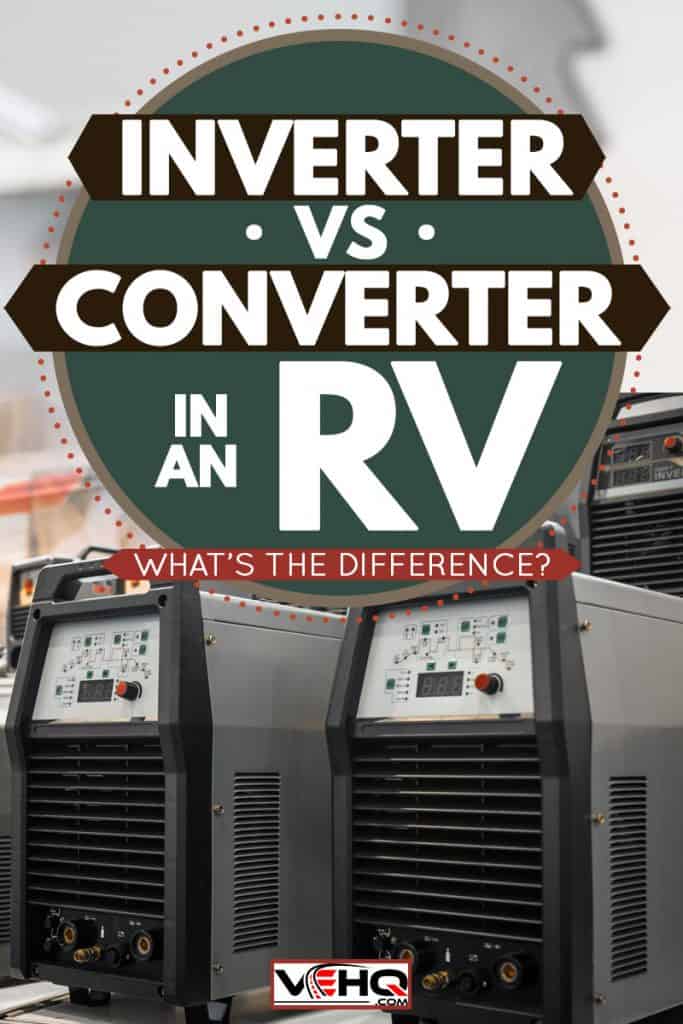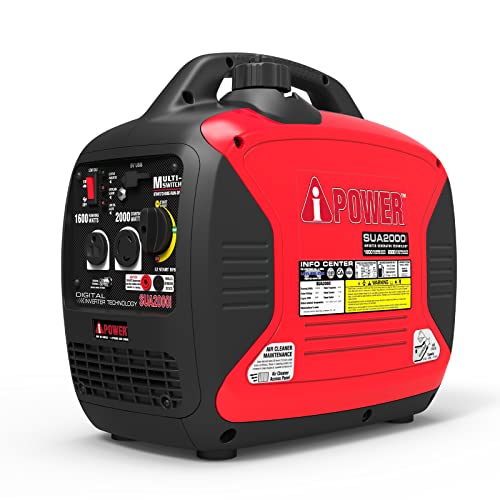RV power systems are intimidating, whether you are a veteran RV owner or new to the RV game. There's a lot happening here, and getting something wrong could result in substantial damage to your RV and interconnected systems or appliances. So, to examine an inverter versus a converter, what's the difference? We've researched both thoroughly, to give you all the answers you need for this RV equipment.
Your RV has more than one power system, which means you need to match the right kind of current for the appliance or gadget that you're using. An RV inverter transforms DC current into AC current. Conversely, a converter transforms AC current into DC current. You will need either an inverter or a converter, depending on the power source in your RV and the appliance that you want to operate.
Keep reading as we cover important information regarding RV inverters and converters. We'll discuss what happens when converters go bad, whether to use inverters and converters interchangeably, and whether to run an inverter all the time. Finally, we'll let you know whether you need an inverter at all.

AC And DC: What's The Difference?
Before we delve into inverters and converters we should first explain how AC and DC currents come into play with an RV. AC stands for alternating current. DC stands for direct current. While it's important to know the basics of these terms, it is not necessary to get too deep into the science of electric currents to understand the relevance to RV power systems. To sum it up, AC power is what your house uses, and DC is what your RV uses.
Take a look at the different types of outlets used for AC and DC power. A standard US outlet like the one pictured below is used for AC power.
The cigarette lighter-style plug found in most vehicles is used for DC power.
What Is An RV Inverter?
RV's use DC power. Most other electrical things in your life are designed to use AC power. An inverter is a piece of equipment in your RV that transforms the DC current from your RV's batteries into AC current.
Depending upon the age and size of your RV, it may already have an inverter installed. If your RV does not have a pre-installed inverter, it is possible to add one. There are many options available, so you should do some planning before purchasing or installing an inverter in your RV. Keep in mind that no matter what inverter you install, you will still be limited by the power capacity of your battery bank.
When shopping for an inverter, you should know that not all inverters are the same. If you're just looking for the basics, here are a few tips:
Modified Sine Wave Inverters
Modified sine wave inverters are acceptable for most things that need power in your RV. As a bonus, they are typically cheaper than other inverter options.
Click here to see this on Amazon.
Pure Sine Wave Inverters
If you need to power significant things, such as medical equipment, you should consider buying a pure sine wave inverter. These are usually more expensive, but you get better quality power for your money.
Click here to see this on Amazon.
To better understand modified sine wave versus pure sine wave type inverters, we suggest clicking here to read about different wave formations created by inverters.
Check out our blog, "The RV Inverter Guide for Beginners," for all the details on selecting and installing an inverter.
What Is The Converter In An RV?
Because RV batteries use DC power the converter takes AC (like from shore power) and transforms it into a DC current. Many items in your RV might rely on DC to reduce the need for an inverter. So, depending on the configuration of your electrical system, these items likely receive power via a converter.
At the bare minimum, you need a converter to charge your batteries. The exception is if you can hook your batteries directly to a DC power system like solar, for example.
What Happens When The RV Converter Goes Bad?
So, what happens when a converter fails? In short, if you rely on shore-power to charge your batteries, a bad converter means the batteries will not charge. Depending upon how your RV is wired, you may not notice this right away. For example, if everything in your RV uses DC electric energy from the battery bank, you shouldn't notice an issue until the batteries die. When you attempt to charge the batteries through an AC power source, it will be apparent that something is wrong.
Can An Inverter Be Used As A Converter?
If you're familiar with solar power systems, you are probably familiar with the concept of running an inverter in reverse. As we have discussed, an inverter transforms DC current into AC current. Some inverters are capable of also transforming AC to DC.
It is not uncommon to have this type of inverter in a household solar system, tied to an electrical grid. These inverters allow for power from the grid (coming into your home as AC) to be converted to DC current to charge your solar battery bank.
It is important to note that not all inverters are capable of doing this. Unless you have an inverter specifically designed to perform this function, you should not try to wire your inverter to transform AC into DC power.
Do You Need An Inverter In A RV?
To the get most out of your RV experience being able to convert power between AC and DC is essential. Our lives are full of many appliances, and other items, that require AC power. Think about your laptop or your coffee maker, for example. These items, and many others used every day, are designed for AC current. If you have no way to transform the DC current of your RV into the AC form, you can't use these things.
To get around this, you could always park your RV in a place with shore power available. You don't need an inverter if you only use these items when you are connected to an AC power source. Another alternative would be to have a generator. Similar to shore power, a generator charges your batteries via the RV's converter. Generators also provide a source of AC power for your AC current items.
Click here to see this on Amazon.
For those of you who spend a lot of time off the grid in your RV, an inverter might turn out to be a necessity. Truly "off-grid," shore power is not an AC power source. You could run a generator, but it will also generate loud noise. Listening to a generator run for an extended period of time can really ruin a serene camping spot. Being able to use the power in your battery bank, for both AC and DC power, without an outside power source can make life much more enjoyable.
An inverter is not necessarily something that you absolutely need, but it is certainly something that many people want. Many people find that the convenience factor is well worth having an extra piece of equipment in their RV.
Should Your Inverter Be On All The Time?
There are definitely times when you should leave your inverter on, and times when you should shut it off. Keep in mind that the inverter is drawing power from your battery bank. Leaving your inverter on could lead to draining your batteries.
If you are connected to shore power, you should leave your inverter on. Leaving the inverter on guarantees that you will not experience disruptions to the power in your RV. If the grid supplying the shore power goes out, you will not be affected until your batteries run down enough that they need to be charged.
If you are driving your RV, leave the inverter on. The engine's alternator, which charges the battery for a vehicle's electrical systems, will charge the battery bank as you drive. You can safely use AC powered items while the RV is driving around without fear of draining the batteries.
If your RV is parked and is not connected to a power source, turn the inverter off while not in use.
To Conclude
An inverter takes DC power from your battery bank and transforms it into AC power. A converter takes AC power from an outside power source and transforms it into DC power to charge your battery bank. RVs usually have converters, but not all will have inverters. You can add these systems to your RV. However, if you're not comfortable installing them yourself, an RV dealer should be able to do it for you. A knowledgeable RV dealer can also recommend the right equipment for your current electrical system. Remember, as with anything involving RVs, the customization possibilities are virtually endless.


